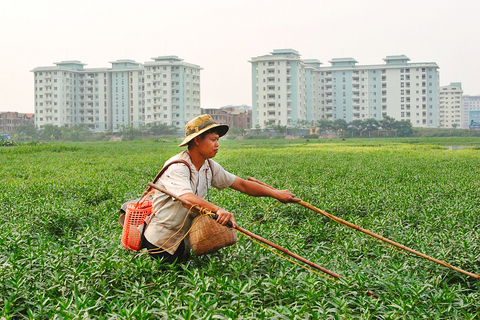When China joined the WTO in December 2001, its entry sparked jitters and a round of reassessments among Southeast Asian economies that were then just limping back to life after the devastating 1997 financial crisis.
Five years on, Vietnam's pending WTO entry has triggered a new rash of regional jitters, although certainly less pronounced this time around.
Vietnam is the rising star in ASEAN. It has boasted one of the world's fastest-moving economies in recent years following the classic ASEAN/Chinese success story of fueling growth on low-cost labor, export-oriented industrialization and foreign direct investment.

PHOTO: EPA
Entering the WTO will make Vietnam much more competitive when it comes to attracting investment away from ASEAN's former "little dragons" -- Indonesia, Malaysia, Singapore and Thailand.
And when its comes to attracting foreign investment, hype helps.
"For Thailand, it's not going to make it any easier," said Stefan Buerkle, head of business economics at the Thai-German Chamber of Commerce.
"Vietnam is a bit more sexy than Thailand, what with all the hype," he added.
Hype aside, Vietnam has made tremendous progress over the past decade in reducing its red tape, improving its business climate and generally putting out a more-welcoming welcome mat for investors.
With its entry into the WTO, the rest of the region will face stiffer competition for investment and trade, especially in labor-intensive industries such as footwear, garments and even electronics, adding to the pressure in these sectors are already coming under from low-cost giants China and India.
"The [electronics] sector is definitely being challenged from regional countries," said Ramya Subreameniem, economist with IDEAGlobal in Singapore.
Vietnam poses the prospect of more "hollowing out of computer peripherals," she said.
Singapore needs to continue concentrating on high-value products where it is doing well such as semiconductors, she noted.
Electronics factories produce nearly half of Singapore's non-oil domestic exports and account for 36 percent of the manufacturing sector.
Indonesia, where cheap labor continues to be a major selling point, can anticipate yet more competition from Vietnam as a WTO member, adding to the already stiff competition coming from low-cost China.
"If you're talking textiles and shoes, we're already threatened by China," acknowledged Chativ Basri, an economist at the University of Indonesia and sometimes advisor to Indonesian President Susilo Bambang Yudoyono.
Indonesia's once-prosperous shoe export industry, for instance, has been battered by slipping sales over the past five years after losing its competitive edge with China and up-and-coming Vietnam, while at the same time failing to move up the value-added chain.

Intelligence agents have recorded 510,000 instances of “controversial information” being spread online by the Chinese Communist Party (CCP) so far this year, the National Security Bureau (NSB) said in a report yesterday, as it warned of artificial intelligence (AI) being employed to generate destabilizing misinformation. The bureau submitted a written report to the Legislative Yuan in preparation for National Security Bureau Director-General Tsai Ming-yen’s (蔡明彥) appearance before the Foreign Affairs and National Defense Committee today. The CCP has been using cognitive warfare to divide Taiwanese society by commenting on controversial issues such as Taiwan Semiconductor Manufacturing Co’s (TSMC, 台積電) investments in the

INVESTIGATION: The case is the latest instance of a DPP figure being implicated in an espionage network accused of allegedly leaking information to Chinese intelligence Democratic Progressive Party (DPP) member Ho Jen-chieh (何仁傑) was detained and held incommunicado yesterday on suspicion of spying for China during his tenure as assistant to then-minister of foreign affairs Joseph Wu (吳釗燮). The Taipei District Prosecutors’ Office said Ho was implicated during its investigation into alleged spying activities by former Presidential Office consultant Wu Shang-yu (吳尚雨). Prosecutors said there is reason to believe Ho breached the National Security Act (國家安全法) by leaking classified Ministry of Foreign Affairs information to Chinese intelligence. Following interrogation, prosecutors petitioned the Taipei District Court to detain Ho, citing concerns over potential collusion or tampering of evidence. The

‘COMPREHENSIVE PLAN’: Lin Chia-lung said that the government was ready to talk about a variety of issues, including investment in and purchases from the US The National Stabilization Fund (NSF) yesterday announced that it would step in to staunch stock market losses for the ninth time in the nation’s history. An NSF board meeting, originally scheduled for Monday next week, was moved to yesterday after stocks plummeted in the wake of US President Donald Trump’s announcement of 32 percent tariffs on Taiwan on Wednesday last week. Board members voted to support the stock market with the NT$500 billion (US$15.15 billion) fund, with injections of funds to begin as soon as today. The NSF in 2000 injected NT$120 billion to stabilize stocks, the most ever. The lowest amount it

NEGOTIATIONS: Taiwan has good relations with Washington and the outlook for the negotiations looks promising, Minister of Economic Affairs J.W. Kuo said Taiwan’s GDP growth this year is expected to decrease by 0.43 to 1.61 percentage points due to the effects of US tariffs, National Development Council (NDC) Minister Paul Liu (劉鏡清) said at a meeting of the legislature’s Economics Committee in Taipei yesterday, citing a preliminary estimate by a private research institution. Taiwan’s economy would be significantly affected by the 32 percent “reciprocal” tariffs slapped by the US, which took effect yesterday, Liu said, adding that GDP growth could fall below 3 percent and potentially even dip below 2 percent to 1.53 percent this year. The council has commissioned another institution